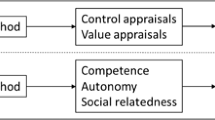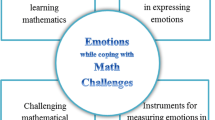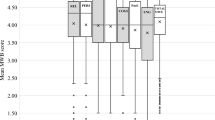Abstract
The theoretical frameworks presented in this Special Issue are appraised with respect to how they might enhance teachers’ or researchers’ work with ‘special needs’ students learning mathematics. The notion of ‘special needs’ is used in a broad sense, encompassing specific Special Educational Needs as well as students with low attainment. The analysis indicates that the different frameworks offer some distinctive methods for research or ideas for interventions, either individually or within multi-lens approaches. It also points to other perspectives, not represented here, that could be relevant for a growing understanding of issues of affect in mathematics education.
Similar content being viewed by others
References
Ahmed, A.: 1987, Better Mathematics, HMSO, London.
Butterworth, B.: 1999, The Mathematical Brain, Papermac, London.
Buxton, L.: 1981, Do You Panic About Maths? Heineman Educational, London.
Dweck, C.: 2003, Self-Theories: Their Role in Motivation, Personality and Development, Psychology Press, Taylor Francis, Hove, E.Sussex.
Frederickson, N. and Cline, T.: 2002, Special Educational Needs, Inclusion and Diversity: A Textbook, Open University Press: Buckingham.
Geake, J. and Cooper, P.: 2003, ‘Cognitive neuroscience: Implications for education?’ Westminster Studies in Education 26(1), 7–20.
Harkin, J., Turner, G. and Trevor, D.: 2001, Teaching Young Adults: A Handbook for Teachers in Post Compulsory Education RoutledgeFalmer, London.
Henderson, A.: 1998, Maths for the Dyslexic: A Practical Guide, David Fulton, London.
Inglese, J.: 1997, ‘Teaching mathematics to pupils with autistic spectrum disorders: exploring possibilities’, Equals 3(2), 18–19.
Magne, O.: 2003, Literature on Special Needs in Mathematics: A bibliography with some comments (4th edition), Educational and Psychological Interactions 124, School of Education, Malmö Sweden.
Goldman, D. (narrator): 2004, Distructive Emotions and How We can Overcome Them. Bloomsbury, London.
Nunes, T. and Moreno, C.: 1998, ‘Is hearing impairment a cause of difficulties in learning mathematics?’ in C. Dolan (ed.), The Development of Mathematical Skills, Psychology Press, Hove UK, pp. 227–254.
Ollerton, M.: 2001, ‘Inclusion and entitlement, equality of opportunity and quality of curriculum provision’, Support for Learning 16(1), 35–40.
Rodd, M.: 2005, ‘Inclusion in practice: Special needs pupils in mainstream mathematics’, in S. & P. Johnstone-Wilder, D. Pimm & J.Westwell (eds.), Learning to Teach Mathematics in the Secondary School, 2nd edition, Routledge, London, pp. 187–205.
Sharp, B.: 2004, Meeting SEN in the Curriculum: MATHS David Fulton Publishers, London.
Weare, K.: 2004, Developing the Emotionally Literate School, Sage Publications Ltd., London.
Author information
Authors and Affiliations
Corresponding author
Rights and permissions
About this article
Cite this article
Rodd, M. Commentary: Mathematics, Emotion and Special Needs. Educ Stud Math 63, 227–234 (2006). https://doi.org/10.1007/s10649-005-9014-0
Received:
Accepted:
Published:
Issue Date:
DOI: https://doi.org/10.1007/s10649-005-9014-0




